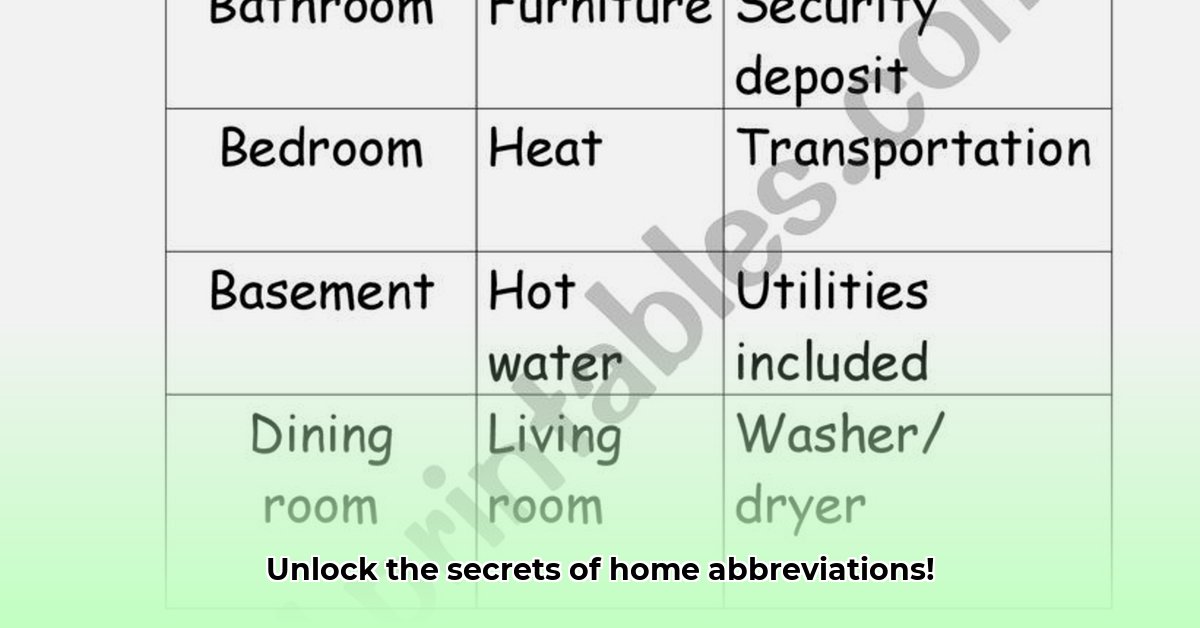
Decoding the world of real estate often feels like learning a new language, especially when faced with the numerous abbreviations used in property listings and documentation. This comprehensive guide will equip you with the knowledge to confidently navigate the common shorthand, minimizing misunderstandings and maximizing your efficiency whether you're buying, selling, or analyzing market trends. Understanding these abbreviations is crucial for efficient communication and accurate data interpretation.
A Quick Reference Guide to Common Residential Abbreviations
This glossary provides definitions for frequently encountered real estate abbreviations. Note that while many are consistent across regions, local variations exist; always verify with your local Multiple Listing Service (MLS) for complete accuracy.
| Abbreviation | Full Form | Definition | Regional Variations/Notes |
|---|---|---|---|
| BR | Bedroom | Number of bedrooms in a property. | Universal usage. |
| BA | Bathroom | Number of bathrooms in a property. | Universal usage. |
| SFR | Single-Family Residence | A detached house on its own lot, typically with one dwelling unit. | Widely used; rarely causes confusion. |
| Condo | Condominium | Individually owned unit within a larger building, sharing common areas. | Consistent across most areas. |
| TH | Townhouse | Multi-unit dwelling, often attached to others, potentially with shared walls. | Interpretation may vary; some may include rowhouses or duplexes. Check your local MLS. |
| DUPLEX | Duplex | Building with two separate living units, typically side-by-side or stacked. | Generally consistent usage. |
| SqFt | Square Feet | Measurement of interior living space, usually calculated floor area (excluding garages). | Universal usage. |
| Acres | Acres | Measurement of land area; one acre equals 43,560 square feet. | Universal usage. |
| A | Active | Property is currently listed and available for purchase. | Widely used. |
| P | Pending | An offer has been accepted, and the sale is in process. | Common abbreviation; may include additional designations (e.g., "Appraisal Pending"). |
| MLS# | Multiple Listing Service Number | Unique identifier for a property within a specific MLS system. | Format varies by region. |
| HOA | Homeowners Association | Organization responsible for maintaining common areas in condo or townhouse communities. | Widely used. |
Navigating the Nuances: Addressing Potential Inconsistencies
While many abbreviations are straightforward, inconsistencies can arise. "TH" (townhouse), for instance, may encompass various dwelling types depending on the region or MLS system. Similarly, "Pending" can represent different stages within the sales process. This ambiguity highlights the crucial need for clear communication and verification. Don't hesitate to clarify any uncertainties with your real estate agent or by consulting your local MLS's glossary of terms.
Actionable Strategies for Key Stakeholders
This section provides practical advice tailored to specific real estate professionals and consumers.
1. Real Estate Agents: Maintain consistency by utilizing your local MLS's preferred abbreviations. Clear, unambiguous communication builds trust and ensures smooth transactions.
2. Buyers and Sellers: Ask questions! Don't hesitate to seek clarification from your agent if any abbreviation is unclear. Thorough understanding prevents costly misunderstandings.
3. Data Analysts: Implement robust data cleaning techniques to handle variations in abbreviations encountered in different datasets. Standardizing your database is crucial for accurate analysis and reporting. Consider using natural language processing (NLP) techniques to classify and standardize your data.
The Path Towards Standardization
While complete standardization of real estate abbreviations remains a work in progress, ongoing efforts towards a universally accepted glossary will significantly benefit the industry. Increased consistency would streamline communication, prevent errors, and ultimately enhance market transparency.
Conclusion: Unlocking the Power of Real Estate Terminology
Mastering residential real estate abbreviations is essential for effective communication and informed decision-making. Although inconsistencies persist, understanding the common abbreviations, utilizing available resources (such as MLS glossaries), and asking clarifying questions will significantly improve your ability to navigate this market with confidence. The future of standardization presents an exciting opportunity to elevate the efficiency and clarity of the entire process.